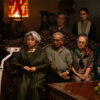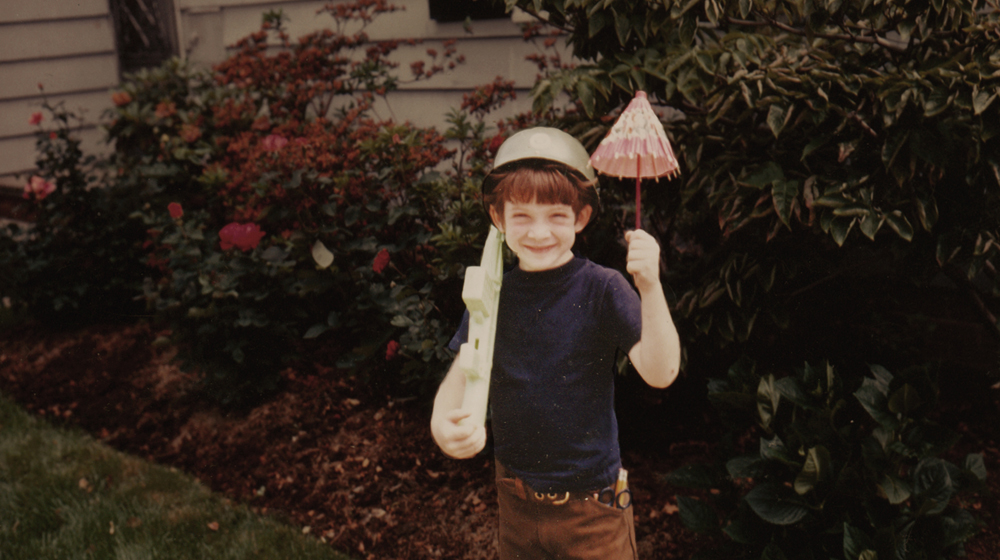David Sampliner wanted to find his voice, literally. It was eight years ago when he was taking voice lessons as part of the creative dabbling he’d done since his twenties, hoping to record some songs he had written.
“Sometimes there’s nothing more naked than singing in public to other people,” says Sampliner, who finally found the opportunity in his latest film “My Own Man” by crooning a subtle, savory cover version of “Free to Be You and Me” over the end credits. “The singing of that song was part of my attempt to be vulnerable.”
Just one part. With “My Own Man,” Sampliner used his other abilities, specifically as a documentary filmmaker, to make a film about the growing number of men who struggle with responsibility and what it means to be a man, particularly in comparison to the generation that preceded them where traditional markers of success such as a good career, marriage and family were more narrowly defined. Growing up in the shadow of his father, a surgeon who played professional soccer while he was still in medical school, Sampliner becomes his own subject in “My Own Man,” investigating through interviews with his family and friends how after attending Yale just like his dad his path to manhood became more circuitous.
As Sampliner digs deep into his personal history, he also cheekily takes up a number of self-help exercises, enlisting the help of a life coach, attending a men’s group where bongo drums are played and even going hunting where simply the kickback of the rifle proves too much in hopes that it will prepare him for the impending birth of his first son. Yet the result of all these efforts over the course of six years is a surprisingly poignant study of the changing nature of masculinity, showing what traces of the idealized character of a man’s man will continue to persist and how its limitations helped shape contemporary culture.
Shortly after the film made its debut on Netflix this past week following a successful run on the festival circuit, Sampliner spoke about making such a personal film, the liberation of the camera and showing it to his family for the first time.
How did the decision actually come about to turn the camera on yourself?
When I started taking voice lessons, I started almost instantly having really profound emotional experiences that went well beyond singing. I thought I should make a film about voice lessons. They seem to be this place where a person really has to dive into who they are and come to a better understanding of themselves. The singing lessons seemed to be about self-transformation. But when I thought about doing that, I thought about getting access to other people who would be willing to expose all of that. It seemed like that would be particularly difficult, so it just occurred to me that maybe I should just turn the camera on myself because I should be the vulnerable one.
Did the act of shooting a movie give you the confidence to have conversations with your family and friends you might not otherwise have?
It is true that making this movie put me in the frame of mind to go and have these conversations that I probably wouldn’t have had over coffee. That intentional nature of making a film did force me to have conversations and experiences that I never would have had. I wouldn’t have seen the life coach, then I never would have gotten his directive to write a letter to my father that I was going to make this film. It was remarkable how all along the way, I had big conversations with people in my family and friends that I never would have had, but it also encouraged me to have experiences that then transformed me in ways that went far beyond the film.
This may have been projecting myself onto your experience, but it seemed there was a definite skepticism about the self-help exercises you start taking part in. Did you become a believer in any of it?
I have a healthy sense of irony about self-help. Certainly, self-help can turn easily into self-indulgence and self-delusion. There can be a narcissistic quality to it, but I also think that working on one’s self, like me working on myself, is the only way I would become a better person. There are versions of it that I think do help and there’s things that don’t. I hope the film communicates my sense of humor going into some of those things. But time and again, I was surprised by the things I thought I would approach with a sense of humor, like being in a men’s group or seeing a life coach [where] I went in with this sense that maybe I’ll be able to mock it a little bit or it’ll be funny in the film.
Lo and behold, many of those things were really profound experiences that I no longer was laughing at, but was really just astonished at the power they had to change me or to put me on a course where I could work on myself. No bigger example of that I think was my men’s group. I ran into that just, exploring it like an embedded investigative reporter. I was like, “What are men’s groups? I have to go see what they’re all about.” It turned out to be something that I have continued to do. It’s good to approach self-help schemes with some skepticism, but I got a lot out of them by approaching them with my mind open.
Was this a tricky film to organize?
For five and a half years, I was more or less the only editor on the film. The film got much, much better by hiring an editor, Michael Culyba. I approached this film from a lot of angles. I talked to lots of experts that I never ended up using. Michael was the one who told me this needs to be really personal and we need to get rid of everything that isn’t really personal. It’s not like I didn’t know I had some emotionally powerful stuff there, but he was the one who really pushed me to organize the whole film with story around that stuff. What’s most important about this film is its humor and its open-heartedness, so I credit him for organizing everything through those principles.
Since you keep it so personal, did those conversations with experts actually help shape the film even if they didn’t make the cut?
It did. Having conversations with experts made me grow to understand that what I was really interested in, what was really going to matter was the specificity of my own story. The more we started talking in third-person generalities about who men are, those generalities generally fall flat and aren’t true. Also, they weren’t really going to serve this particular film. Actually, the strength in my material was the personal nature of it. There’s a film out right now called “The Mask You Live In,” which was at Sundance this year and in some ways, it’s the other tact you could take, [having] lots and lots of experts.
The greater my sense was to write about what masculinity is, I just grew to see that that didn’t have much of a place in the film. That was really by talking to experts. In fact, someone encouraged me to do this, when I went and talked to the experts, I would ask them a couple of those general questions and then I would ask them to reflect truthfully on their own manhood journey themselves. I was really trying to apply a personal angle with any of the experts that I spoke to, but even when I did that, the material just didn’t hold up and didn’t seem to work with more personal material.
What it was like to watch this with your family for the first time?
I had a rough cut screening with just my immediate family around the time I was applying to [festivals], so I wanted them to see it first. When I showed it to them, they were supportive, but I could tell they all had real concerns. My dad articulated his concerns like a movie critic. He said, “I think the editing is really great, but I have real problems with the ending.” He gave me notes. My sister and my mom really were much more protective of my dad. They were very concerned that the film might be unfair to him, that people would see him only as an ogre and not as the more complete person that he is. They had legitimate concerns that audiences wouldn’t take away what they would like them to take away about my father.
It was really the experience of my family members seeing the movie in a theater with an audience for the first time at Tribeca where they all really got that the film is a fair portrait. People had a very warm response to my dad. [My family] got to feel in the movie theater how universal the film felt, that it wasn’t just airing family laundry, but that it could really speak to other people and be really important. I think all of those things helped them feel better about the film and made them tell me more honestly that they were much more upset by seeing the film for the first time than they let on when we watched it together. It was funny. After they saw it in Tribeca they go, “We now love the film. We really didn’t like it before.” That’s been gratifying to get really the full blessing from my family, which I believe I have.
Have you been surprised by how universal this is, judging by other people’s reactions?
Certainly, it was my hope from the beginning. When I had the first glimmer of the idea, I didn’t think, “Wow, I’m such a fascinating person. There should be a film about me.” Rather I said, “I have these insecurities that I feel like lots of other men have and don’t talk about. Maybe my job here is to represent that for people and give other men permission to explore these things, maybe even other women too.”
In fact, a great surprise has been how much the film has seemed to resonate for women, not just because of the men in their life, but because of parts of the film that are all about family healing and dealing with difficult relationships within the family. I did think I was making a film for other men, but I didn’t suspect that I might be making a film for women too. That’s been gratifying.
Was there any significance to the song at the end of the film, which you perform? With the knowledge that voice lessons started you down this path, I thought there might be a connection.
The connection is only that I am somebody who has always really loved singing. I’ve done a little bit of public singing in my life, but not a lot. Over time, it’s just part of myself that I’ve wanted to expose more and to do more of, even though I know that I’m never going to be a professional singer. That’s what drove me actually to take the voice lessons. I also knew I wanted to have the song to be “You And Me” in the film. I did think of having professional singers/songwriters perform the song. But I thought maybe the perfect thing [would be] saying the words of this song, completing the character’s arc in the film. This act of singing the song was actually part of the journey I’m talking about in the film of self-acceptance and a comfort with who I am.
“My Own Man” is currently streaming on Netflix.




